How to Make Reading and Spelling “Stick”

Have you ever taught your child something one day, only to have him completely forget it the next? That is one of the most frustrating things as a teacher, isn’t it? One of your main goals is to make reading and spelling “stick” in your child’s brain, and this blog post will give you solid techniques for doing just that.
Short-Term vs. Long-Term Memory
This will be quick, but it is important to understand the basic differences between short-term and long-term memory.
Short-term memory is a system for temporarily storing, managing, and recalling the information necessary to carry out particular tasks. It keeps track of things like where you parked your car an hour ago or what you plan on having for dinner tonight. For your kids, facts stored in short-term memory might include the spelling for the word stationery or the new grammar rule they learned this morning.
Long-term memory, on the other hand, is a system for permanently storing, managing, and retrieving information for later use. Long-term memory helps us remember and recall things like proper spelling, punctuation rules, and vocabulary words. Items of information stored as long-term memory may be available for a lifetime. And that is what you want for your child—permanently ingrained learning.
Why Review Matters
If you want to make learning stick, you must include review in your lessons.
Parents and teachers often lament, “I taught this same information to Joey last month, and now he’s forgotten it.” They wonder what is wrong. They don’t realize that presenting the material once or twice isn’t enough. It’s not their fault—they just honestly don’t know how critically important it is to review. Review is an area that isn’t stressed nearly enough by educators or curriculum developers.
But the truth is, to make sure that your child really knows the material, you must have consistent and direct review. You can’t leave it up to chance and hope that your teaching will stick in his brain. As his teacher, you must take responsibility and ensure that your child remembers important information.
A Plan to Make Reading and Spelling Stick
Without a plan, you are probably settling for short-term learning without even realizing it. Short-term learning is damaging for several reasons. Not only is it a waste of time, but it also sets up a cycle of intense frustration for both you and your child.

When your child forgets a lesson soon after you present it, you feel like you are spinning your wheels and not getting anywhere. You might even begin to wonder if your child has a learning disability. But even worse than that, when he can’t remember his lessons, your child probably feels like something is wrong with him. Depending on his personality, he may internalize the frustration or he may act out. Either way, it becomes harder for both of you to sit through lessons that you know aren’t going to stick.
There is a way out of this no-win situation, though.
7 Review Strategies in AAR and AAS
Seven important review strategies are built right into the All About Reading and All About Spelling programs.
- First, we make sure your child understands the main point of the lesson.
Your child doesn’t need to guess—it’s crystal clear what the goal of the lesson is. For example, when your child is learning how to add suffixes to base words, he’ll learn what suffixes and base words are, and the difference between consonant suffixes and vowel suffixes. Using letter tiles and suffix tiles (and our clear, scripted lesson plans), you’ll demonstrate exactly how to add suffixes to words. We test and polish the wording of every lesson to make sure that the teaching is understandable. After all, the lesson must be understood before it can be reviewed.
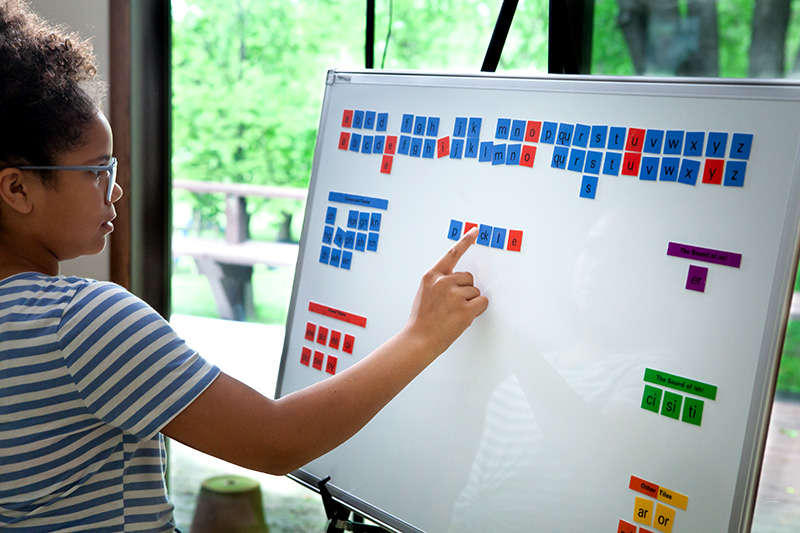
- Next, review is built right into the lessons.
At the beginning of every lesson, we prompt you to do a quick review of previously taught material. The built-in review ensures that you remember to do it and won’t be tempted to skip over it.
- Multisensory methods are used during review time.
Since children learn best using sight, sound, and touch, it’s important to use a variety of methods to review material. You’ll review reading and spelling concepts in multiple ways: with word analysis activities, flashcards, recitation, games, and practical applications like problem-solving, dictation, writing, and conversation. And we use the SMI method (Simultaneous Multisensory Instruction) for even more powerful review sessions.
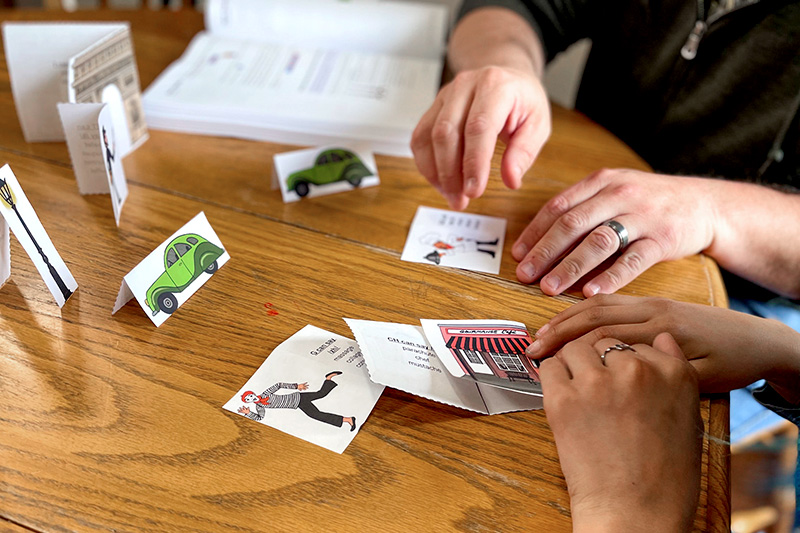
- Review is more frequent when a new concept is first taught.
Timing is important. If you teach a new idea, but then don’t revisit it for a while, the chances that your child will forget it are much greater. That’s why we make sure that new material is reviewed daily at first. We keep it interesting with a variety of techniques like the Review Box, Fluency Practice sheets, Word Banks, and activity sheets. As your child shows mastery, we review less frequently, making room for other new concepts. Revisiting information this way pushes it into long-term memory and keeps it there.
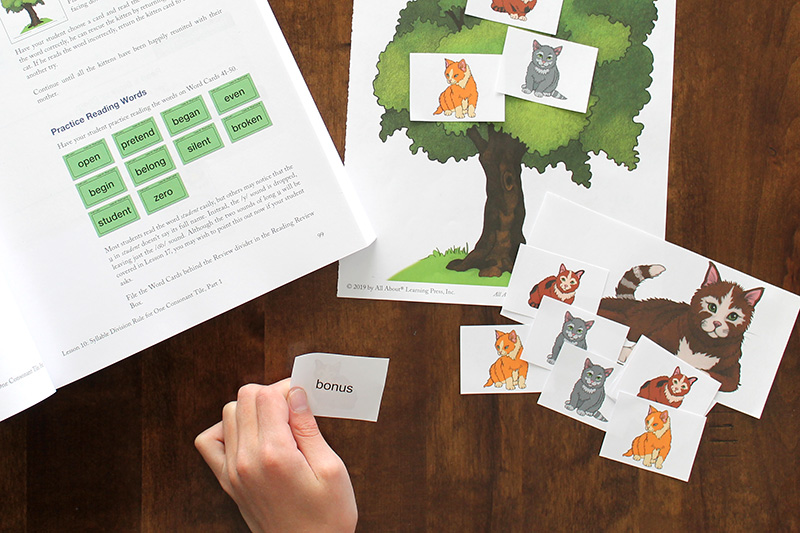
It’s also important to note that sometimes it appears that your student understands a concept when you first demonstrate it, but it may not be burned into long-term memory—so we don’t stop the review too soon. You want your child to be able to access the information years from now, not just a week from now, so concepts are reviewed at intervals and continued until the material has been completely mastered.
- Certain concepts are reviewed using the same words until they are completely mastered.
For example, when learning a spelling rule, we use the same wording each time we review it: C says /s/ before e, i, or y. Let that wording get ingrained in your child’s long-term memory so he can access it later when needed.
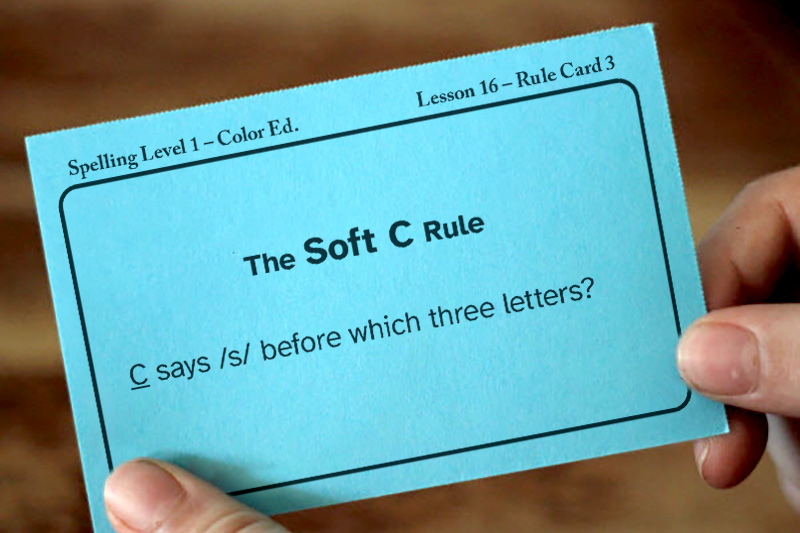
- Review is customized for each child.
Review is not a one-size-fits-all endeavor. Your child may need more or less review on a specific topic than the next child. If a concept has been mastered, you file it behind the “Mastered” divider in the Review Box and move on. If more practice is needed, you file it behind the “Review” divider. The system is as simple as can be, yet very powerful for making learning stick.
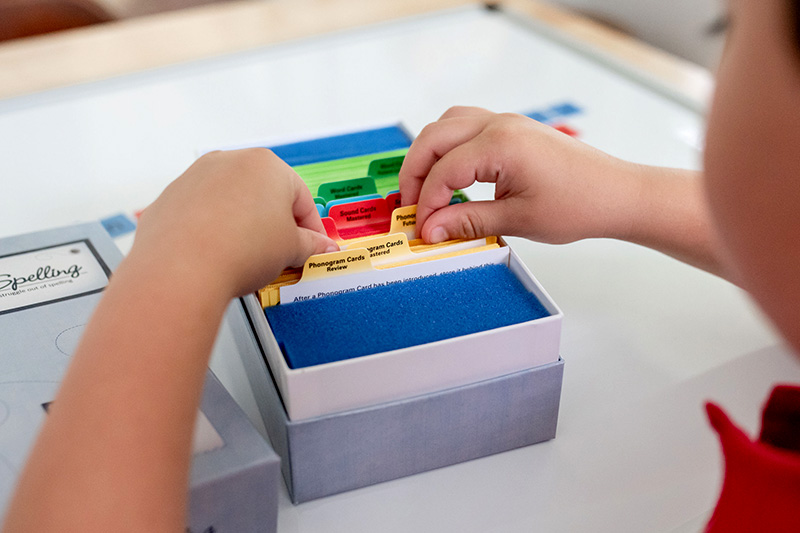
- Concepts are never “retired.”
We don’t just “teach it and forget it.” After we introduce a new concept, the lessons have your child apply his new knowledge to keep it fresh in his mind. Your student will use spelling words in dictation activities and encounter reading words in activities and short stories.
These review strategies are seamlessly woven into the entire reading and spelling programs. You don’t have to consciously remember to do them because they are built right into the curriculum. You can sit back, relax, and enjoy watching your child make consistent progress!
Additional Help for Your Child’s Memory
Download my free e-book, “Help Your Child’s Memory,” to learn more techniques to help strengthen your child’s memory and achieve learning that really sticks.
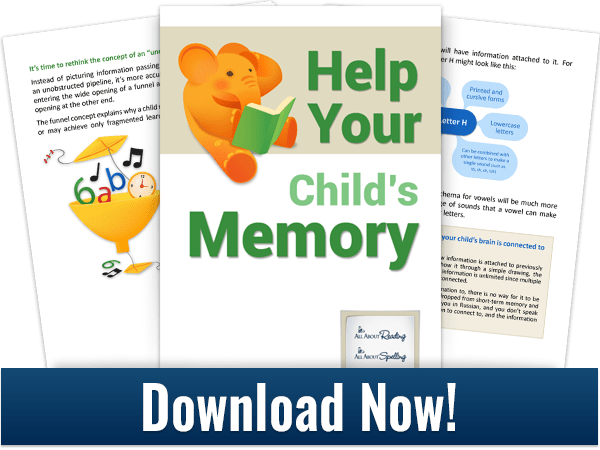
In this e-book, you will discover…
- Why information goes right over your child’s head … and what to do about it
- How the “Funnel Concept” can improve your teaching and result in long-term learning
- Schemas—what they are and how they help improve memory
- What “Simultaneous Multisensory Instruction” is, and why it is such a powerful teaching method
- Six things you can do today to improve your child’s working memory
Do you have a favorite review activity you enjoy using with your children? Share in the comments below!




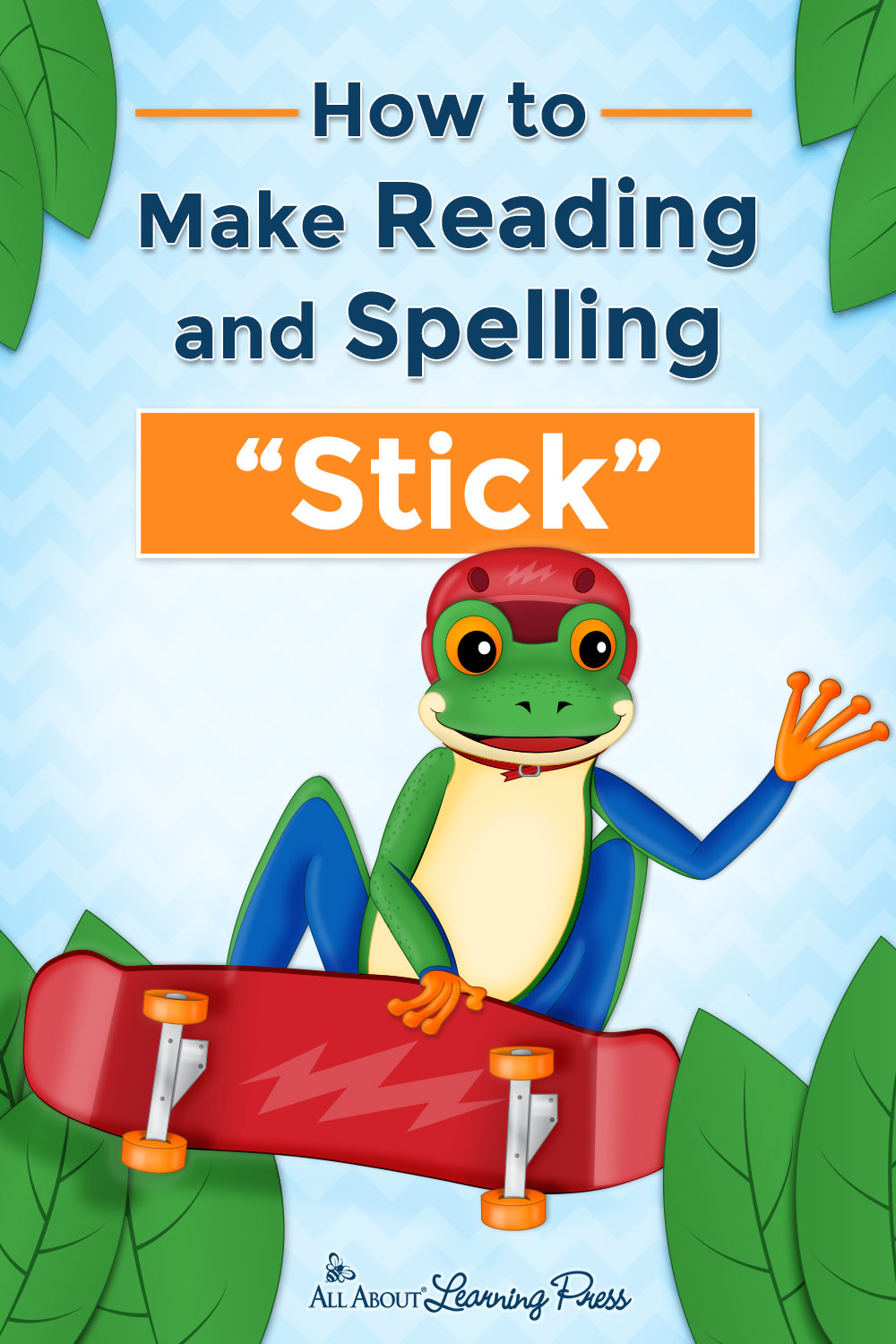








Li
says:What to do when a student skips or adds words when reading?
Robin
says: Customer ServiceGreat question, Li!
This is such a common issue that we have a blog article to help. Check out Help! My Child Skips Small Words When Reading.
If this doesn’t address your concerns, let me know. I’m happy to help!
Kathrine
says:Thank you for the post. I notice that after sounding out a word like “much,” in the lesson, after my daughter has initially sounded out each of the letter tiles and is getting ready to blend, she’s forgotten the sounds she just sounded out.
Robin
says: Customer ServiceKathrine,
I’m sorry to hear that your daughter is struggling with this.
Is she using the full Blending Procedure, including the cumulative blending steps? You can download the Blending Procedure PDF on our Helping Kids Sound Out Words blog post.
Start each day with a demonstration of the Blending Procedure with the Letter Tiles until she is able to demonstrate all the steps back to you. (Help as much as she needs while he’s learning to do this, but eventually, it should be easy for her and she will be able to demonstrate it without help):
– First, point to each tile and say the sounds. “/m/-/ŭ/-/ch/”
– Second, draw the finger under the first two tiles. Blend those and then point to and say the last sound. This cumulative blending step is really important for kids who tend to forget the sounds or mix them up if they try to jump from the first step to the fourth. “/mŭ/-/ch/”
– Third, draw the finger slowly under all three letters and blend those. “/mŭch/”
– Fourth, say it fast or “say it like a word.” “much”
It may be that focusing on that third cumulative blending step helps your child with this difficulty. It often does for children.
Does she also have trouble remember sounds with CVC words like map and sit? If she is having trouble decoding words, even if it is just one word in 10 or so, then she needs to not be moving forward in her reading lessons, not learning new sounds, concepts, and rules. She needs to be able to blend sounds into words easily, and without hesitation and help. Otherwise, she is not ready for more complex phonograms and words.
I hope this helps some, but I’m happy to converse with you as much as you need to help your daughter. We can talk here, or you can email me at support@allaboutlearningpress.com.
Jerry Njumbo
says:Your explanatory sequence of steps is so laudable!
Robin
says: Customer ServiceThank you, Jerry!
Cristopher
says:This info is invaluable. When can I find out more?|
Robin
says: Customer ServiceGreat question, Christopher! We have a free ebook available on how to Help Your Child’s Memory that will have lots more information for you.
Sarah
says:We are happy to have found this program!
Kelly
says:We have used AAR1 with tremendous success and are so excited to start AAR2. The review is essential!!!
Robin E.
says: Customer ServiceGreat to hear All About Reading is working out so well for you, Kelly!
Savannah
says:Good tips!
Robin E.
says: Customer ServiceThanks, Savannah!
Becca
says:We have had great success with AAR levels one and two and I’m eager to try out AAS!
Jessica Rooney
says:Oh this is very helpful! I have been working on pre-reading skills with my daughter and we both get frustrated by her not remembering what we just talked about
Robin E.
says: Customer ServiceThat is frustrating, Jessica! I understand. I hope this helps you, but if you need more help or have questions, please let me know.
Kim
says:So helpful and exactly why we love AAS! The instructions are short, simple and to the point – and we make them fun!
Robin E.
says: Customer ServiceThank you, Kim!
Heidi
says:What great recommendations! Thank you!
Darby
says:Wow as a first time kindergarten homeschool teacher I never knew I had been settling for short term learning. I’m so glad to see a brighter future for us.
Liz
says:Thanks so much for all the strategies to optimize learning/memory- applicable in so many areas both academic and in the practical day to day.
Robin E.
says: Customer ServiceYou’re welcome, Liz. I’m happy this has been helpful for you.
Mindy Schlotman
says:Thank you for this message! It was very helpful!
Robin E.
says: Customer ServiceYou’re welcome, Mindy. I’m glad to hear that it was helpful for you!
Paula V.
says:Thank you for all the tips on improving memory and how to help the lessons stick and for incorporating them into the program.
Robin E.
says: Customer ServiceYou’re welcome, Paula. Let me know if you need more ideas or have questions.
Amy
says:These are great ideas!
Audrey
says:This is very helpful. I need to make sure to review more to move lessons from short to long term memory.
Robin E.
says: Customer ServiceI’m glad this was helpful, Audrey. Review is important for long-term learning.
Dani
says:It is easy for me to skip review – thanks for the reminder to NOT do that!
Robin E.
says: Customer ServiceYou’re welcome, Dani! Review is so important.
Carol Tines
says:Very helpful post. I’m excited to start teaching my kid to read this year.
Robin E.
says: Customer ServiceI’m glad this was helpful for you, Carol!
Kristen Mitchell
says:Such a good reminder before summer comes! I’m going to do better this year at setting aside some reading time.
Robin E.
says: Customer ServiceYes, summers can be tricky, Kristen. We have a How to Beat the Summer Slide blog post you will find helpful as well.
Sam Heims
says:This is a great article. My kids struggle so much with spelling.
Floriana
says:We love making our own matching games with reviewed information!
Robin E.
says: Customer ServiceMaking review into a game is a wonderful way to keep it fun and interesting, Floriana!
Laticia
says:Lately I’ve been ending our school day with a word review “hopscotch” with my kindergartener and she loves it! We’ll do our word reviews like this until it gets old :)
Robin E.
says: Customer ServiceI love the idea of a word review hopscotch, Laticia! And I really like the idea of ending each day’s lesson with the same activity. It would become a sort of closing ritual that would let the student know they are done. Thank you for sharing this idea.
Steffi S.
says:We recently made a simple card game for reviewing middle vowel sounds. Just getting started on our learning to read and spell journey.
Robin E.
says: Customer ServiceGames are a great way to make reviewing fun and help learning stick, Steffi!
Tania
says:I really enjoyed reading this article and Others. Insightful and encouraging. Thank you also for the free ebooks to compliment the strategy for building in short and long term memory.
My daughter is epileptic and dyslexic, so all tips and tricks that help support her are of high value to us. Thank you Most sincerely. We are
Looking forward to implementing in our homeschool classroom.
Robin E.
says: Customer ServiceI’m glad you found this article and others on our blog helpful for your daughter, Tania!
If you ever have any questions or need anything, please let us know.
Andi
says:I like #7; basically, never teach material in isolation. All learning should overlap whether it’s science and language or math and music. And never do an activity just to do it, combine it or present it in a way that 2 or 3 subjects are incorporated to give it meaning and get the most bang for your buck (time).
Robin E.
says: Customer ServiceAndi, yes! Making connections is a very important part of making learning stick. We even have a blog post about it, How Making Connections Helps Your Child’s Memory.
Cheryl
says:Interesting stuff. Thanks.
Shannon Alexander
says:I think that is my problem-I don’t really have a plan. I don’t review like I need to.
Elaina
says:Looking forward to starting AAS soon! Love the review reminders through these programs!
Joanna
says:Great reminder of how important reviewing is! I admit I can find it tiresome sometimes, but it’s so necessary!
Robin E.
says: Customer ServiceJoanna,
Yes, reviewing can be tiresome. That’s why we recommend using games and activities for reviewing to make it more fun and even something to look forward to. We have lots of review ideas on our blog. Take a look at 12 Great Ways to Review Reading Word Cards, 10 Great Ways to Review Spelling Word Cards, and How to Teach Phonograms (which includes four printable games for reviewing phonograms.)